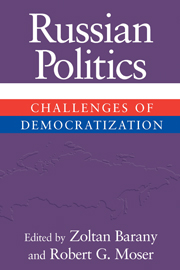Book contents
- Frontmatter
- Contents
- List of Tables and Figures
- List of Contributors
- Acknowledgments
- Introduction: Challenges of Russian Democratization
- 1 Russian Electoral Trends
- 2 Executive–Legislative Relations in Russia, 1991–1999
- 3 The Russian Central State in Crisis: Center and Periphery in the Post-Soviet Era
- 4 Russian Economic Reform, 1991–1999
- 5 Politics and the Russian Armed Forces
- Conclusion: Democracy and Russian Politics
- Index
5 - Politics and the Russian Armed Forces
Published online by Cambridge University Press: 05 June 2012
- Frontmatter
- Contents
- List of Tables and Figures
- List of Contributors
- Acknowledgments
- Introduction: Challenges of Russian Democratization
- 1 Russian Electoral Trends
- 2 Executive–Legislative Relations in Russia, 1991–1999
- 3 The Russian Central State in Crisis: Center and Periphery in the Post-Soviet Era
- 4 Russian Economic Reform, 1991–1999
- 5 Politics and the Russian Armed Forces
- Conclusion: Democracy and Russian Politics
- Index
Summary
The Russian armed forces are out of control. The threat is not Bonapartism but, rather, civilians or officials who might similarly use the politicized armed forces.
Not since June 1941 has the Russian military stood as perilously close to ruin as it does now.
Analyses of established democracies rarely include sections examining the political involvement of their armed forces, for the simple reason that it is inconsequential. General studies on Eastern European democratic transitions are usually attentive to the armed forces only to the extent that, by virtue of their control of the tools of coercion, the military's political stance could potentially determine whether the transfer of power was peaceful or violent. By contrast, the military had assumed a key political role in Latin American and Iberian democratic transitions, because prior to democratization these were praetorian systems ruled by the armed forces, and therefore the most important concern of transition was the manner in which generals left politics.
What about Russia? The Soviet Union was not a praetorian state, and the Russian/Soviet military has essentially no modern tradition of political involvement. Why are civil-military relations a portentous component of Russian politics? The reason is that the depoliticization of the military and the extension of solid civilian oversight authority to all armed forces are imperatives of successful democratization, yet Russia has not accomplished them. In fact, its political elites have done little to develop democratic civil-military relations.
- Type
- Chapter
- Information
- Russian PoliticsChallenges of Democratization, pp. 174 - 214Publisher: Cambridge University PressPrint publication year: 2001



